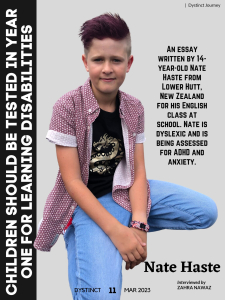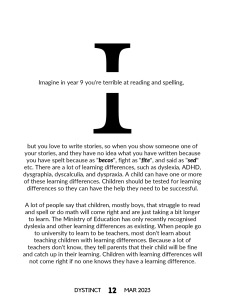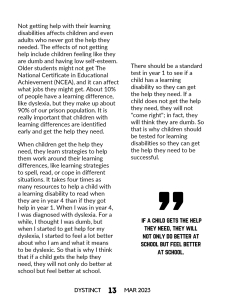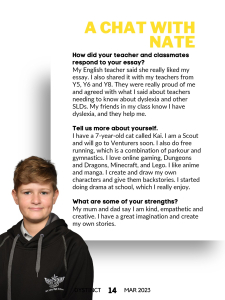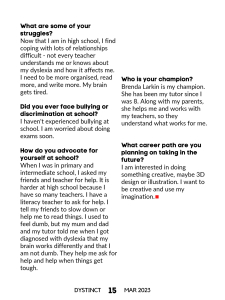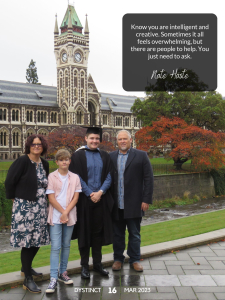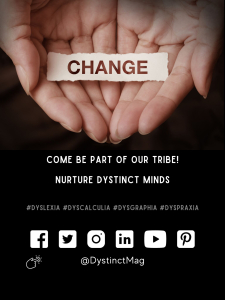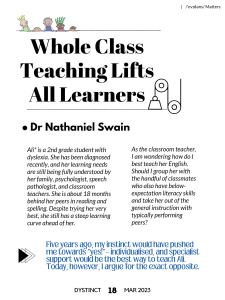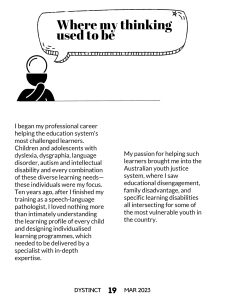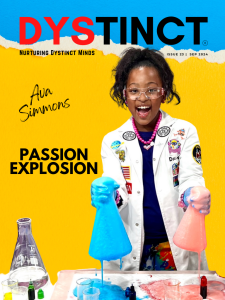
Purchase Options
Available for: iOS/Android App + Web Reader
In This Issue
- 1) Children Should Be Tested in Year One for Learning Disabilities: By Nate Haste
- An essay written by 14-year-old Nate Haste to emphasise the importance of testing children for learning disabilities in year one to provide them with appropriate support and strategies early on to prevent long-term negative effects.
- 2) Whole Class Teaching Lifts All Learners- by Dr Nathaniel Swain (Teacher, Instructional Coach, Writer, and Founder of thinkforwardeducators.org/)
- Dr Nathaniel Swain reflects on how and why his preferred method of supporting struggling learners in classrooms has shifted from individual learning intervention and differentiated groups to robust whole class instruction at tier 1 that allows struggling learners to realise their academic potential through repeated exposure to more of the same excellent quality instruction as their peers.
- 3) Why is Emotional Literacy the Key to Success for All Learners? – by Dr Sarah Moseley (Researcher, Consultant, and Trainer in all areas of SEND, dyslexia, and school improvement drsarahmoseley.com/)
- Dr Sarah Moseley emphasises the importance of developing emotional literacy in children, particularly those who struggle, to help them find internal motivation and overcome adversity on their path to success.
- 4) Dystinct Journey of Mila Smith – This is Mila (facebook.com/thisismilabook)
- This is the story of Mila Smith, an eleven-year-old author from Trinidad and Tobago. Despite facing challenges with reading and writing, Mila wrote and self-published her book "This is Mila" at the age of eight, which celebrates her strengths and unique qualities.
- 5) Shared Book Reading: An Activity for Children of All Ages- by Dr Tessa Weadman (Speech Pathologist, Lecturer, and Researcher at Latrobe University, School of Education)
- Dr Tessa Weadman highlights the benefits of shared book reading for children's oral language and early literacy development and provides strategies for parents to engage in interactive reading with their children.
- 6) There Are Many Stories – by Dr Jennifer Petrich, Sara Lee, and Bradley Johnson (theliteracydr.com)
- Dr Jennifer Petrich, Sara Lee, and Bradley Johnson narrate how they embarked on a journey of structured word inquiry with struggling students, thereby leading them to understand the power of the English writing system, fostering connections in the meaning and structure of words, and empowering them to rewrite their own stories with their newfound confidence and independence.
- 7) Understanding Executive Functions - The Impact of Task Initiation Difficulties by Helen Trethewey (Public Speaker, Dyslexia Specialist, Educational writer twiceexceptionallearners.com/)
- Helen Trethewey explains how task initiation, an executive functioning skill, can be a genuine difficulty for many students and how educators can help students overcome struggles with task initiation in classrooms.
- 8) Dystinct Journey of Nolan Courchaine
- The story of nine-year-old Nolan Courchaine, the determined young boy from Indiana, USA, who has taken up running as a means to raise funds to give back to his school which has played a significant role in his academic and social development.
- 9) Teaching the Alphabetic Principle with a Speech-To-Print Approach- By Holly Ehle (Kindergarten teacher, Literacy specialist, Founder of facebook.com/thescienceofliteracylearning)
- Holly Ehle discusses what current research reveals about how the brain processes and stores phonemes and graphemes in the brain and what implications that science has for classroom instruction that seeks to teach letter-sound correspondences and the alphabetic principle.
- 10) Nurturing Neurodiversity and Empowering Neurodiverse Learners to Drive Their Own Brains – By Sarah Sharpe (Neurodiversity Education Specialist sharpe-minds.com/)
- Sarah Sharpe discusses the importance of adopting a strengths-based approach when addressing the learning needs of neurodiverse individuals and provides practical tips on how educators can ensure neurodiverse students are provided with every opportunity to reach their full potential.
- 11) ADHD, Executive Function Challenges, and Behavioral Challenges in the Classroom- By Cindy Goldrich (Mental Health Counselor, ADHD/Executive Function Parent Coach, Teacher, and Coach Trainer PTScoaching.com)
- Cindy Goldrich discusses the social and emotional impact of ADHD and Executive Function challenges on learning, motivation, behavior, and the family system and provides strategies for teachers and parents to support children with ADHD in the classroom.
- 12) Without Words: Immerse Your Child Into the World of a Wordless Picture Book's Wondrous Artistic Adventures -By Joanna Migo (Dyslexia Therapist therainbowreading.com)
- Joanna Migo demonstrates how the wondrous world of wordless picture books introduces children to metacognitive reading strategies while promoting visual literacy, imagination, and language development, paving the way for later reading success.
- 13) Dystinct Journey of William Jack (pizzarebellion.co.uk)
- The journey of William Jack, the dyslexic entrepreneur behind the Sussex-based robotic pizza vending machine company called Pizza Rebellion that won the Best UK Business Innovation award at the Pizza, Pasta and Italian Food Association awards in 2022.
Purchase Options
Available for: iOS/Android App + Web Reader
About Dystinct Magazine
Dystinct Magazine seeks to find the extra ordinary that lies within the ordinary. Every dyslexic child is blessed to be distinctively different. We have set out to identify and nurture these differences to instil a strong sense of achievement in children who are often forgotten about. We also bring to you relevant up to date advice from leading experts in the industry to help you navigate the path to success.
1 in 5 children who pass through our one size fits all education system are on the dyslexia continuum, diagnosed or not. They are repeatedly dismissed as too dumb or unaidable leaving desperate parents with very few avenues to turn to. Our beautiful children are broken by the very system that is meant to nurture and raise them. These are promising young minds who are made to feel worthless over and over again because the system has failed to recognise their differences. Their struggles are often brushed under the rug or the system recognises their existence but lacks the capacity to make the changes necessary to accommodate their uniqueness.
There is a need to change the narrative around dyslexia from that of ‘slow’, ‘not working hard enough’, ‘lazy’ to one of hardworking, passionate, uniquely different and worthy.
Dystinct Magazine aims to instill a strong sense of self-worth in dyslexic children who have had unfair opportunities chipping away at their self-esteem throughout their existence. Our mission is to foster a community that celebrates the difference of dyslexia.
Not every dyslexic child is magically a genius. Oftentimes, we spend hours looking for the genius or outside the box thinking in our dyslexic kids failing to realise that it was in them all along, hidden in plain sight under the years self-doubt and shame that the society ingrained in them for not matching up to their peers. We aim to peel back at these negative layers of damaged self-esteem and provide the children with a platform to truly appreciate their uniqueness, take pride in their difference and revel in the knowledge that within their difference, lies their strength.
We are here with a commitment to empower dyslexics and their champions so that, they can discover the strengths within themselves and appreciate the uniqueness that dyslexia has offered them.
Category:
Publisher: Dystinct Magazine
Published: Quarterly
Language: English
Compatibility: iOS/Android App + Web Reader
About The Publisher
I’m Zahra Nawaz from Melbourne, Australia. While I’m not chasing after my boys or cooking up a storm in the kitchen, I work with dyslexic and... read more
